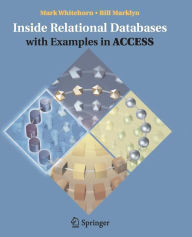
Inside Relational Databases with Examples in Access / Edition 1
by Mark Whitehorn, Bill MarklynView All Available Formats & Editions
ISBN-10: 1846283949
ISBN-13: 9781846283949
Pub. Date: 10/28/2006
Publisher: Springer London
The first two editions of Inside Relational Databases have both been best sellers. These new editions will also cover the relational database model but will use different engines to illustrate the model. In doing so, readers will be able to apply the model using their preferred database engine. Initially three versions are planned starting with Access, SQL Server
Overview
The first two editions of Inside Relational Databases have both been best sellers. These new editions will also cover the relational database model but will use different engines to illustrate the model. In doing so, readers will be able to apply the model using their preferred database engine. Initially three versions are planned starting with Access, SQL Server and my SQL.
The books show just how simple and useful databases can be. No prior knowledge is required i.e. real world examples show how to manage data efficiently.
A significant amount of new material is included in the core of the book and particular emphasis is given to showing how to make a database run faster and more efficiently.
Product Details
- ISBN-13:
- 9781846283949
- Publisher:
- Springer London
- Publication date:
- 10/28/2006
- Edition description:
- 2007
- Pages:
- 372
- Product dimensions:
- 8.27(w) x 10.98(h) x 0.04(d)
Table of Contents
From the contents
Part 1 - A simple, single-table database.- Introduction to Part 1.- Tables.- Forms.- Queries/Views.- Reports.- Tables.- Rows and columns.- Records and fields.- Numbers of rows and columns.- Field Names.- Table structures.- Building a table.- Types of data.- Meaningful operations.- Excluding certain errors.- Making storage more efficient.- Making data recall more rapid.- Field size.- General notes on table design.- Think first.- Context-PC or not PC? That is the question.- Controlling data entry.- Field names.- Splitting names, addresses etc.- Don’t store redundant information.- Base tables - not defined here.- Queries/Views.- Queries usually find subsets of the data.- Queries, answer tables and base tables finally defined properly and closure mentioned briefly.- Summarizing data.- Other useful queries.- Update.- Append.- Delete.- Graphical querying tools.- SQL and Views.- Forms.- Multiple forms per table.- Text boxes can be made read only.- Text boxes don’t have to present data from just one field.- it isn’t necessary for each field in a table to appear on the form.
Customer Reviews
Average Review: